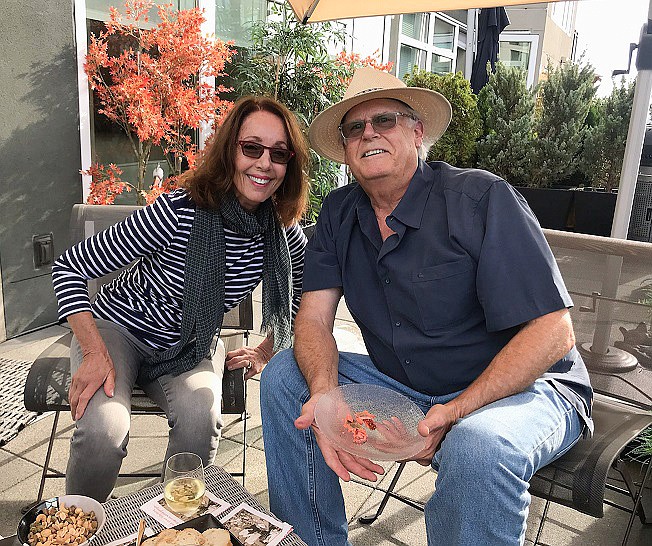Rules of the Road: Self-Directed Travel for Couples
July 30, 2023 at 7:33 a.m.
 Sunny and John are experienced travelers: here they are at Abu Simbel – one of Egypt’s Seven Wonders – and riding camels in Aswan, Egypt
Sunny and John are experienced travelers: here they are at Abu Simbel – one of Egypt’s Seven Wonders – and riding camels in Aswan, Egypt
Remember how it felt to play hide and seek after dark when you were a kid?
That sense of being a young free spirit can be recaptured and shared as a couple.
I’m going to encourage you to get out from underneath your debts and possessions for a while, get extremely simple, and plot your own non-tour trip together. With so many VRBO travel options, it might seem pointless to need rules. Hey, we all have cars and know how to drive, but it’s helpful to know when there’s a bump ahead.
Here are some guidelines to get you started with not just a vacation rental but a vacation experience.
- Prioritize Trip Expectations before you make final arrangements to start your journey. Which aspect of travel is the most important to each of you? Is it seeing things? Cultural activities and events? Dining? The quality of your hotel accommodations? Outdoor adventures? Discussing your priorities before you start can avert a lot of tension.
- Carry Your Own Stuff. Self-directed travel is not the time for chivalry as much as it is time for self-responsibility. Learn how to pack compactly. I don’t mean “Marie Kondo” compactly. You won’t have a luggage valet… so can you lift your luggage above your head onto a rack, lug your suitcase uphill on cobblestone streets, up and down stairs, in and out of vehicles? Reduce and repack.
- Be Responsible for Your Own Stuff. Packing and tracking duties are not rightfully delegated to one partner to perform for both people. When you leave an accommodation, both of you can take one last look around to assure nothing was forgotten which will avoid scenes like, “Mabel (or Frank), why you didn’t pack my toothbrush? Where did you leave it?” This is an ouch scenario and please read on.
- Do Not Insult Your Partner. This probably sounds obvious. It’s not. People get nervous and fearful when they travel and are in strange situations. A lot of couples have a pattern of taking that nervousness and using it as a club on the other person. Here is an example of couple communication that I’ve heard time and again on the road: “You don’t know what time our tickets say we’re leaving, do you?” This is an unnecessary affront. Instead of being a travel pain, be a travel partner and take a look at the tickets yourself! One example: “I notice the ticket says our train leaves at 4pm. Check out time is 9am.; any ideas on what to do with the luggage?” Super! This is a lot better! Whatever the situation, try a problem-solving approach rather than blaming the other person or an insult-approach. Trust me, if you do this to your partner often enough or in public, there will be reprisals. And as a foreigner, how you express yourself is noticed. You will get negative looks from travelers in other countries if you use demeaning tones with your partner and English-speaking travelers will avoid you. It’s not nice, and people will let you know.
- Again…Do Not Put-Down Your Partner. This is worthy of comment because it seems to be a pattern of long-term relationships that is not pretty. The Buddhists have a basic tenet that advises against praising yourself at the expense of others; they believe this is a spiritual misdemeanor. Many of the world’s countries are Buddhist and American behavior baffles them; they don’t understand why someone would shame another person. It sounds like this, “Let me tell you about the time Mabel (or Frank) left everything on the bus in Australia -- boy we were inches away from being totally screwed.” This communication theme represents situations where someone is looking for an audience and trying to be funny, but this person is only being sarcastic. These behaviors will isolate you and you will lose one of the charms of self-directed travel -- meeting other people.
- At No Time Say, “I Told You So.” Ouch again. Mistakes are going to be made. You are in a foreign place, using foreign money, eating different food and perhaps not sleeping as soundly every night as you usually do. You are going to get on the wrong bus, forget things, misinterpret signs, use the wrong bank and lose on an exchange rate. Blaming your partner for something and, double indemnity, then having to show your own superiority, is asking for an argument. Why go there? Hold your tongue, tomorrow is another day and maybe your turn to be wrong, act stupid, or lose something.
- Play fair. You got the last compromise. Don’t be greedy. I see couples all the time where one person clearly bulldozes their way into getting what they want, and the other person is too nice. If that’s your couple-style, international travel probably won’t change it. Compromise helps each person to continue feeling excited about travel.
- Take a Rest Day. When you are walking and forget where you are going, or you re-count your change the third time because the calculation seems so hard today, or stumble on a straight sidewalk -- these are symptoms of travel fatigue. Go back to your room and crawl into bed; you may need to take a couple of days to do nothing except eat and sleep.
- Take Turns Being the Lead. Share “river guide” duties. One can negotiate the buses/taxi rates and street names while the other makes decisions about what to do and how to get there. Ideally rotate the role each day.
- Don’t Make Unannounced Left Turns. Turn signals were put in cars to signal intent and prevent crashes. Cell service is not a universal. It is alarming to be strolling along, stop to gaze at something, then look up to see your partner nowhere...and not be able to find them for half an hour. This is a set-up for an argument based in fear. Discuss a “lost in space” meeting place in advance.
SUMMARY
Support each other, don’t criticize.
- Accentuate the positive.
- Practice self-responsibility, not blaming.
- Move at your own pace and stop to rest when needed.
- Respect your travel partner, the people you meet, and the country you are visiting.
You can enhance your relationship quickly by purposely giving sincere complements to your partner for the way they handled something. “That desk clerk was really rude, but you stuck to your guns about seeing the room before paying for it. And you stayed calm and smiled, too. Don’t think I could have done that. You did a good job.” You’re out there on your own, but you have each other. Talk to some solo travelers who have been on the road alone for several months. Nobody pats them on the back; nobody helps renew their energy when they’re beaten down from daily negotiation and isolation.
Couples have distinct advantages in terms of supporting each other and sharing the load. Take delight in this gift.
 Sunny and John know how to have fun on vacation: (left to right) A costume party on the Nile aboard a small river boat; on a Hawaiian vacation paddling on inflatable rafts
Sunny and John know how to have fun on vacation: (left to right) A costume party on the Nile aboard a small river boat; on a Hawaiian vacation paddling on inflatable rafts
Sunny Lucia started backpack trekking when her children left home for college. She has traveled to 45 countries with trips ranging from 3 weeks to 4 months long, lodging frequently in youth hostels. She is a retired health care and corporate training professional living in Seattle with her husband John Twitchell.





